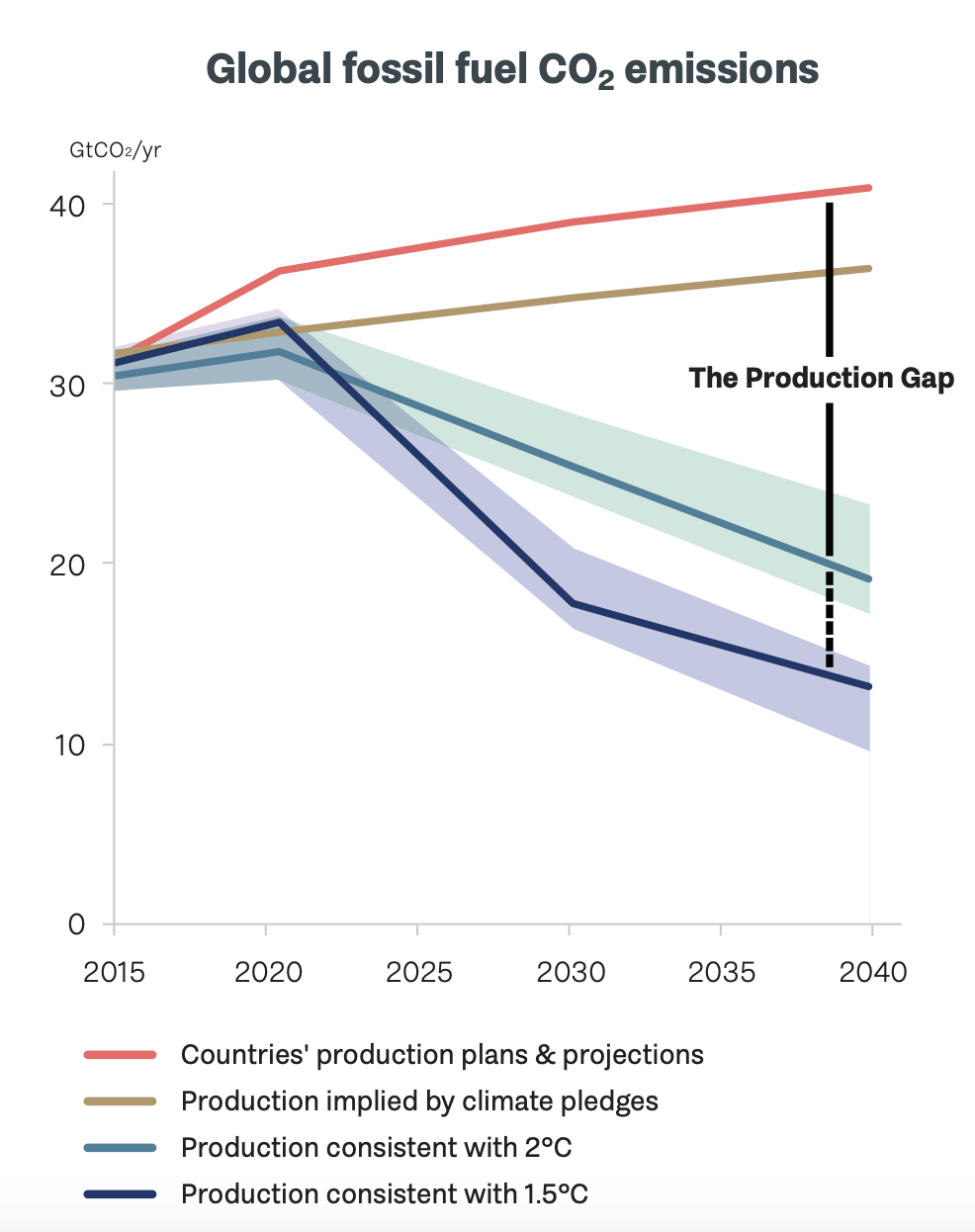As the world races to mitigate a climate crisis, too many nations are having their cake and eating it too. If nothing is done to curb the global extraction of fossil fuels, commitments to the Paris agreement and other national goals will mean very little.
In just ten years, the United Nations estimates the world will produce 50 percent more oil, gas and coal than is necessary to keep temperatures below 2°C, and there will be 120 percent more fossil fuel production than we can have if we want to limit warming to 1.5°C.
"Indeed, though many governments plan to decrease their emissions, they are signalling the opposite when it comes to fossil fuel production, with plans and projections for expansion," reads a recent report from the UN Environmental Program (UNEP).
In other words, the very same nations combatting the climate crisis are also the ones accelerating it. Fossils fuels are responsible for nearly 90 percent of all carbon dioxide emissions, and in 2019, global emissions hit their highest peak yet.
Today, cheap and renewable alternatives are more abundant than ever, and yet more than 80 percent of the world's energy still comes from coal, oil and natural gas.
What's more, many nations are looking to produce even more. By 2030, national projections suggest that countries are planning on producing 17 percent more coal, 10 percent more oil, and 5 percent more gas than would be needed to meet our climate goals.
Between now and 2030, oil and gas production in the US alone is set to increase by 30 percent, and some analysts predict fossil fuel investments will remain in the trillions worldwide, even through 2040.
"As fast as renewable and other climate-compatible energy technologies are rising, however, there is no guarantee that fossil fuels and their greenhouse gas (GHG) emissions will decline - let alone at the pace needed to avoid dangerous climate change," the report explains.
"The continued drive to increase fossil fuel production throughout the world only makes that harder."
Unlike previous reports, which looked at where emissions fall short, this is the first analysis from the UNEP that examines 'the production gap'. This is a new metric that compares what a country plans on producing in fossil fuels and what they actually need to produce to meet their national goals.
If the production gap truly "tells us the magnitude of the challenge" ahead, as the authors say it does, then it looks as though we have a lot of work to do.
Based on scenarios from the recent Intergovernmental Panel on Climate Change (IPCC) special report, it appears our current plans for the future set us on a dangerous path.
Collectively, all ten key countries included in the report - China, the US, Russia, India, Australia, Indonesia, Canada, Germany, Norway, and the United Kingdom - overshot both the 1.5°C and 2°C pathways, as well as their own national plans.
By 2030, countries plan on producing 150 percent more coal than is consistent under the 2°C scenario.
 (UNEP)
(UNEP)
The authors blame this gap on a sheer lack of policies targeting fossil fuel production. And ultimately, once the infrastructure for these projects is built, it's much harder to leave the profits behind.
"Oil and gas are also on track to exceed carbon budgets, as countries continue to invest in fossil fuel infrastructure that 'locks in' oil and gas use," the report concludes.
"The effects of this lock-in widen the production gap over time, until countries are producing 43 percent more oil and 47 percent more gas by 2040 than would be consistent with a 2°C pathway."
Barring an unexpected advance in carbon capture technology, experts say current fossil fuel reserves will need to be left in the ground if we are to meet our goals.
Norway, for instance, could cut the cost of achieving its ambitious 2020 emission targets simply by reducing the amount of money it spends on producing oil. Indeed, several other countries have already pledged to do just that.
"Ensuring a liveable planet for future generations means getting serious about phasing out coal, oil and gas," UN climate official Christiana Figueres told The Guardian.
"Countries such as Costa Rica, Spain and New Zealand are already showing the way forward, with policies to constrain exploration and extraction – others must now follow their lead. There is no time to waste."
The 2019 Production Gap Report can be found here.
